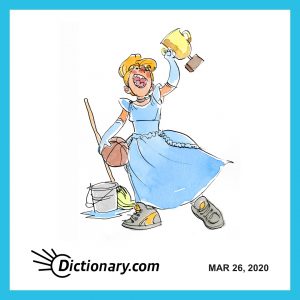Word of the Day
Cinderella
noun
a person or thing that achieves unexpected or sudden success or recognition, especially after obscurity, neglect, or misery.
More about Cinderella
Cinderella is a partial translation of French Cendrillon “Little ashes,” from Charles Perrault’s Cendrillon ou la petite pantoufle de verre “Cinderella or the Little Glass slipper” (1697). The story of Cinderella is ancient: The Greek geographer and historian Strabo tells the earliest recorded version of the folk tale in his Rhodopis (written between 7 b.c. and a.d. 24), the name of a Greek slave girl who married the King of Egypt. The first modern European version of the folk tale appears in Lo cunto de li cunti “The Tale of Tales” (also known as the Pentamerone), the collection of fairy tales written in Neapolitan dialect by the Neapolitan poet and fairy tale collector Giambattista Basile (1566-1632), from whom Charles Perrault and the German folklorists and philologists the Brothers Grimm later adapted material. Cinderella entered English in the 19th century.

how is Cinderella used?
The first Cinderella in the era of the 64-team bracket may be the greatest in history.
Ukraine is the new Cinderella. It could just metamorphose from bankruptcy and potential civil war to surpass elder sister Russia in reform and perhaps even consensus.
Cinderella


More about moue
The noun moue, “a pout, grimace,” still feels very French in its spelling. Some of its Middle English spellings include moue, mouwe, mowhe “grimace, wry face, grin,” all from Middle French mouwe, moe “lip, pout,” from Old French moe “grimace, pout.” Old French moe is probably from unrecorded Frankish mauwa “pout, protruding lip,” or Middle Dutch mouwe “protruding lip.” Moue entered English in the mid-19th century.
how is moue used?
“What, your stitching wasn’t good enough?” The woman made a sympathetic moue.
Disapproval either goes unexpressed or is exaggerated, with a roll of the eye and a theatrical moue and a “She never takes any notice of me, anyway.”
moue


longevous
adjective
Archaic.
long-lived; living to a great age.
More about longevous
The adjective longevous is much less common than its derivative noun longevity. Longevous derives from the Latin adjective longaevus “of great age, ancient,” a compound of the adjective longus “long” and the noun aevum “time, the past, the ages.” Longevity comes from Late Latin longaevitās (stem longaevitāt-) “long life, longevity,” formed from longus and the noun aevitās (also aetās) “age, one’s age,” a derivative of aevum. Longevous entered English in the mid-17th century (and longevity in the second half of the 16th century).
how is longevous used?
a vast majority of these extremely longevous folk were of a placid temperament, not given to worry.
It’s hard to remember a longevous rock band that left on such a high note as these women did in 2006.
longevous





